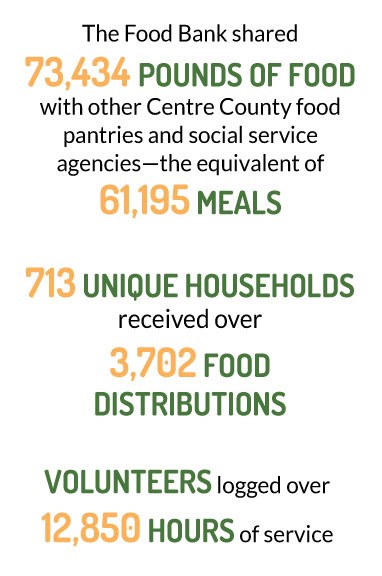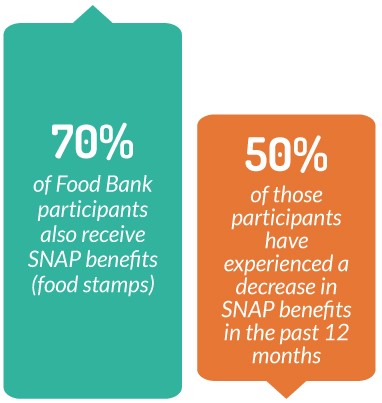Food Donation Sources

How Food Donations Help Neighbors in Need
Food donations from individuals like you are a valuable part of fulfilling the Food Bank's mission. When you donate food, volunteers check the expiration dates, then sort it for placement on shelves to be available for clients. Depending on the volume of specific items, some food may be shared with other agencies or food pantries in Centre County. It’s helpful to check the Greatest Needs list before making your donation, or before conducting a food drive, to assure that you are making the biggest impact!
Food donations are also received through The Federal Emergency Food Assistance Program (TEFAP), the State Food Purchase Program (SFPP), and the Central Pennsylvania Food Bank.
Food drives are a popular way for community groups to give, and the Food Bank is grateful to benefit from food drives conducted by:
- the Letter Carriers' annual Stamp Out Hunger food drive
- the Scouts' annual Scouting for Food drive
- Grocery stories, local churches, and community groups
- Student groups at our local schools
Learn more about how you can host your own Food Drive!
Donation Drop-off Hours
The State College Food Bank has a Donation Drop-Off Room that is accessible to the public around-the-clock (24/7). This room is available to drop-off any non-perishable food and grocery items, and it is located at the back side of our facility to the right of the garage door.
Need a Receipt? Donating Fresh Produce? Donating items that need to stay Refrigerated or Frozen?
If you need a receipt for your donation, or if you are bringing perishable food or beverages, please drop-off your donations during the hours listed below. Perishable food or beverages include, but are not limited to: fresh produce, dairy items, meat, other refrigerated or frozen foods
Monday: 9:00 AM - 12:00 PM
Tuesday: by appointment
Wednesday: 9:00 AM - 12:00 PM
Thursday: 9:00 AM - 12:00 PM
Friday: 9:00 AM - 12:00 PM
Other times by appointment
Donation Guidelines
Refer to the Current Needs List for the most up-to-date list of items that the State College Food Bank needs in our pantry.
On a typical day at the Food Bank, hundreds of pounds of donated food are received from a variety of sources including individuals, organizations, church groups, businesses, etc. While the generosity of the local community is appreciated, some items cannot be used and must be discarded due to food safety guidelines and governmental regulations. The following list provides a description of products that cannot be accepted and distributed to Food Bank clients.
- Past-Date or Expired Items - Donated items that are past the Best-By or Expiration date won't be used in the pantry.
- Homemade/Home Canned Foods - It is unknown how and when homemade foods were processed, which is a food safety concern.
- Opened/Partially Used Items - Opened and/or partially used items will not be distributed. Donated items should be in their original, sealed packaging.
- Dented/Damaged Packaging - Donated items that have severely dented or damaged packaging cannot be distributed (including rusty cans).
- Over-the-Counter Medicines
- Grocery Bags - Due to health code and State College Food Bank policy, used bags are not accepted.
Fresh Produce Donations
We accept produce donations from 9 AM to 12 PM on Mondays, Wednesdays, Thursdays, and Fridays. Please donate produce directly with a volunteer or staff person for proper handling and storage. To ensure the highest quality of food for our clients, we encourage donated produce to meet "market quality" standards as closely as possible. This helps us to efficiently utilize our resources and maintain a high standard of food safety!
We ask our community growers to:
- Donate produce that is free from bolting, splitting, or severe damage.
- Closely follow product packaging instructions regarding any sprays, fertilizers, or other materials used in your garden.
- Wash donations before drop-off to remove soil, insects, and debris. This helps to prevent the introduction of pests to our facility and to have produce ready for distribution!
Questions about fresh produce donations can be directed to our staff at (814) 234-2310 or info@scfoodbank.org.
FRESH PRODUCE: Garden items are greatly appreciated from any garden. The following garden items are accepted:
 Tomatoes
Tomatoes- Cucumbers
- Peppers
- Onions
- Potatoes
- Carrots
- Zucchini
- Squash
- Lettuce
- Radishes
- Beets
- Herbs
- And more!
Non-Food Donations
Clients visit the Food Bank for more than just food! Individuals and families need non-food items like diapers and wipes, period care products, personal care products (toothpaste, soap, shampoo, etc.), paper products, and household supplies.
To learn more about our current non-food needs at the Food Bank, please contact us at info@scfoodbank.org or (814) 234-2310.
Q: Do you accept venison or wild game?


